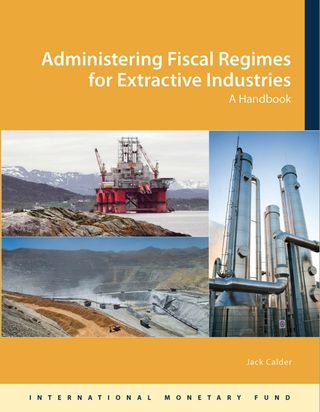Posted by Katherine Baer[1]
On Monday, July 28th, the IMF’s Fiscal Affairs Department (FAD) launched a new book: Administering Fiscal Regimes for Extractive Industries: A Handbook, by Jack Calder[2] [Available here!]
This Handbook, a joint IMF and World Bank publication, is one of the first of its kind to focus attention on effectively administering revenues from the extractive industries (EI). Michael Keen, Deputy Director of FAD, emphasized that effective EI revenue administration is closely linked to the Fund’s overall objectives: “Getting hold of the potential revenues from the extractive industries in a fair, effective and transparent way is critical to achieving the wider objectives of economic development and macroeconomic stability that we are all looking for.”
PFM practitioners in natural resource rich countries have a strong interest in this topic. EI revenue is inherently volatile, and good practices in revenue administration should make revenue projections more reliable, and thus improve expenditure planning. Better forecasting is a substantial contributor to other techniques for dealing with such volatility, such as stabilization funds. In addition, good revenue administration practices contribute to transparency in public finances. The Handbook complements efforts of the Extractive Industries Transparency Initiative (EITI) and the Guide to Resource Revenue Transparency (GRRT), which are associated with the IMF’s Code of Good Practices on Fiscal Transparency. Thus, the Handbook is one more arrow in the quiver of efforts to improve fiscal governance.
The Handbook provides policymakers and government officials in charge of administering EI revenues with practical guidelines to establish a robust legal framework, organization, and procedures for administering these revenues. It discusses transparency and how to promote it in the face of ever-increasing demands from both domestic and international constituencies for clarity and accountability in the administration of public revenues from EI. And it discusses how developing countries can strengthen their managerial and technical capacity to administer these revenues.
Oscar Molina, the director of the Large and Medium-Sized Taxpayer Department in the Mexican Tax Administration, pointed out the practical application of the Handbook for tax administrators like him, stating that “...this Handbook gives precise recommendations on how to organize the tax administration authority that will be in charge of the audit and also the collection of petroleum revenues.”
Administering government revenues from the extraction of nonrenewable natural resources such as oil, gas, coal and other minerals presents special difficulties. At one level one could ask: how hard can it be to collect taxes from firms that are basically digging holes, taking material out of the ground, and transporting it to the point of export or to a domestic refinery, especially as it can be physically measured, weighed, and controlled? But this is not the whole story.
The EI industry has a number of special features that generally result in its being taxed differently from other industries, creating special challenges for administration. These features include nonrenewability; a huge variation in scale and profitability (which can reflect differences in industry size, for example, artisanal mining activity vs. that of multinational enterprises, or variations in profitability over time); exceptional rent-generating potential; high uncertainty and risk; substantial capital investment; long development and operating periods; high export and import levels; distinctive commercial risk-sharing arrangements; frequent transfers of ownership; and a high level of state control and ownership. Large resource revenues frequently lead to poor governance. Many of these special features and difficulties are especially prominent in developing countries. In addition, contractual agreements (including production sharing agreements) and state participation commonly play a more important role in some of those countries than in developed economies.
The special features and perceived difficulties of EI revenue administration can all too easily mean that the subject gets less attention than it deserves. Charles Feinstein, Director of the World Bank’s Energy and Extractives Global Practice, summed up as follows: “Without proper extractives administration, the resource-rich developing countries may not collect their fair share of the proceeds from non-renewable resources, and miss out on mobilizing the internal revenues necessary for poverty reduction investment.” Administrative reform, and technical assistance to support it, may focus on general rather than EI revenue administration—even where general taxation produces much less government revenue than EI taxation, or may ignore EI revenues (from royalties, for example, or even state production shares) that are not seen or classified as normal taxes—even though they may be the most important sources of government revenue.
Representatives of civil society and the oil and gas industry also complemented the IMF and the World Bank on the book, noting that it fills an important gap in the literature on revenue administration.
[1] Division Chief, Revenue Administration Division 2. Fiscal Affairs Department, IMF
[2] Preparation of the Handbook was possible thanks to the Managing Natural Resources Wealth Topical Trust Fund and the generosity of the donors that contribute to it, which include the governments of Australia, Kuwait, the Netherlands, Norway, Oman, and Switzerland, and the European Union.
Note: The posts on the IMF PFM Blog should not be reported as representing the views of the IMF. The views expressed are those of the authors and do not necessarily represent those of the IMF or IMF policy.






